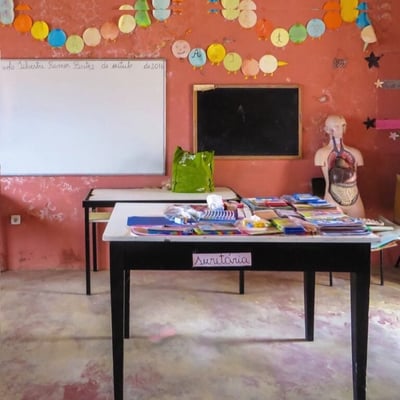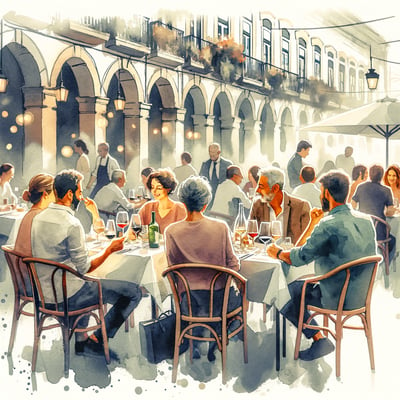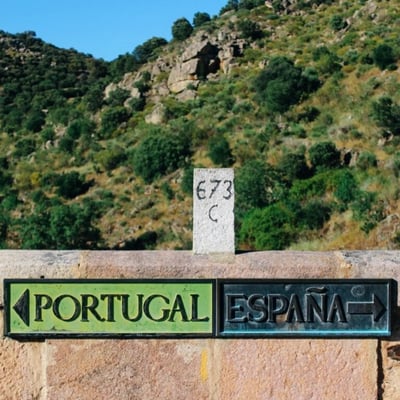1
00:00:01,945 –> 00:00:04,505
Sara: Fernando, viste as minhas chaves?
{{Sara: Fernando, did you see my keys?}}
2
00:00:04,505 –> 00:00:05,765
Não as encontro.
{{I can’t find them.}}
3
00:00:05,765 –> 00:00:08,305
Fernando: Provavelmente, estão na tua mala.
{{Fernando: They’re probably in your purse.}}
4
00:00:08,305 –> 00:00:13,065
É tão grande que é preciso um mapa para encontrar qualquer coisa lá dentro.
{{It’s so big that it takes a map to find anything in there.}}
5
00:00:13,065 –> 00:00:15,405
Sara: Muito engraçado, mas não,
{{Sara: Very funny, but no,}}
6
00:00:15,445 –> 00:00:16,825
não estão na mala.
{{they are not in my purse.}}
7
00:00:17,025 –> 00:00:18,785
Tenho a minha carteira,
{{I have my wallet,}}
8
00:00:18,785 –> 00:00:27,165
o telemóvel, os óculos, a escova do cabelo, a garrafa de água, o caderno e a caneta,
{{cell phone, glasses, hairbrush, water bottle, notebook, and pen,}}
9
00:00:27,265 –> 00:00:30,625
mas as chaves não estão em lugar nenhum.
{{but the keys are nowhere [to be found].}}
10
00:00:30,625 –> 00:00:32,445
Fernando: Podes levar as minhas chaves,
{{Fernando: You can take my keys,}}
11
00:00:32,445 –> 00:00:34,645
porque eu vou chegar mais tarde do que tu.
{{because I’m going to arrive later than you.}}
12
00:00:34,645 –> 00:00:35,945
Sara: Vais?
{{Sara: You are?}}
13
00:00:35,945 –> 00:00:37,925
Quem é que vai buscar o Bruno?
{{Who is going to pick up Bruno?}}
14
00:00:37,925 –> 00:00:40,835
Fernando: Tu, não te lembras da nossa conversa?
{{Fernando: You, don’t you remember our conversation?}}
15
00:00:40,835 –> 00:00:41,945
Sara: Não.
{{Sara: No.}}
16
00:00:41,945 –> 00:00:43,525
Quando é que falámos sobre isso?
{{When did we talk about that?}}
17
00:00:43,525 –> 00:00:45,685
Fernando: Ontem, à mesa de jantar,
{{Fernando: Yesterday, at the dinner table,}}
18
00:00:45,865 –> 00:00:49,405
com a tua chávena de chá na mão e quase a adormecer.
{{with your cup of tea in hand and almost falling asleep.}}
19
00:00:49,405 –> 00:00:50,685
Sara: Tens razão.
{{Sara: You’re right.}}
20
00:00:50,685 –> 00:00:54,325
Estou muito cansada, esqueço tudo.
{{I’m very tired, I forget everything.}}
21
00:00:54,325 –> 00:00:58,205
Mas eu não quero acordar para te abrir a porta à noite.
{{But I don’t want to wake up to open the door for you at night.}}
22
00:00:58,205 –> 00:01:00,745
Vou procurar as minhas chaves mais um pouco.
{{I am going to look for my keys some more.}}
23
00:01:00,745 –> 00:01:03,405
Fernando: Já procuraste as chaves na cama,
{{Fernando: You already looked for the keys on the bed,}}
24
00:01:03,405 –> 00:01:07,345
junto ao teu candeeiro, nas cadeiras da sala…
{{next to your lamp, on the chairs in the room…}}
25
00:01:07,355 –> 00:01:08,975
Na tua mão?
{{In your hand?}}
26
00:01:08,975 –> 00:01:10,925
Sara: Claro que não estão na minha mão!
{{Sara: Of course they are not in my hand!}}
27
00:01:10,925 –> 00:01:12,725
Eu deixo sempre as chaves no quarto,
{{I always leave the keys in the room,}}
28
00:01:12,725 –> 00:01:13,785
mas não estão lá.
{{but they are not there.}}
29
00:01:13,785 –> 00:01:16,445
Fernando: Não estão no cesto das chaves no corredor?
{{Fernando: They’re not in the basket of keys in the hallway?}}
30
00:01:16,445 –> 00:01:17,925
Sara: Aquele que tu compraste?
{{Sara: The one you bought?}}
31
00:01:17,925 –> 00:01:19,755
Eu nunca o uso.
{{I never use it.}}
32
00:01:19,755 –> 00:01:21,925
Fernando: Não o usaste desta vez?
{{Fernando: You didn’t use it this time?}}
33
00:01:21,925 –> 00:01:23,265
Vai ver.
{{Go see.}}
34
00:01:23,265 –> 00:01:24,805
Sara: Oh… Estão no cesto.
{{Sara: Oh… They are in the basket.}}
35
00:01:24,805 –> 00:01:25,985
Não acredito.
{{I don’t believe it.}}
36
00:01:25,985 –> 00:01:27,305
Obrigada.
{{Thanks.}}
37
00:01:27,305 –> 00:01:28,625
Fernando: De nada.
{{Fernando: You’re welcome.}}
38
00:01:28,625 –> 00:01:31,845
Vou começar a escrever cartões a lembrar-te das coisas!
{{I will start writing cards to remind you of things!}}
 We respect your privacy and have a ZERO TOLERANCE for spam.
We respect your privacy and have a ZERO TOLERANCE for spam.
















Hi Guys,
I really enjoy the shorties after each set of lessons. I wondered whether it could be possible to have the questions and answers in audio also, to give practice in listening and repeating the text pronunciation accurately. This would also help with learning to phrase questions.
Thanks again
Laura Parsons
Hi Laura, thanks for the feedback! This is definitely on our list for future updates. 🙂
Hi Molly,
Thanks a million for your prompt and positive response.
When using precisar this way (“it takes”), is there no “de” required?
Thanks for the excellent course!
Good question! In the sentence “É tão grande que é preciso um mapa para encontrar qualquer coisa lá dentro”, preciso is used as an adjective rather than a verb. A more literal translation would be “It’s so big that a map is needed to find anything in there”. So the de is not needed here. I hope that helps!
Makes perfect sense 🙂 Thanks for the speedy reply!
I learned the word basket as feminine, “a cesta.” Is there any difference between this kind of basket and “o cesto”? Thank you!
Olá! Both words exist and are often seen as interchangeable. Personally, when referring to small and shallow containers (like a fruit basket), I’ll use either one of them with no distinction. For larger, deeper containers, like a clothes basket, I tend to only use the word cesto. It may not be the same for everyone/everywhere.
Hi guys, I have two questions for this one:
1) In the sentence “porque eu vou chegar mais tarde do que tu.”. How do we get ‘do que’ is it just a fixed expression or a de+o construction and if so where does the ‘o’ come from?
2) In what circumstances is esquecer reflexive? I have seen esquecer and esquecer-se used and I am never sure which is appropriate now?
Thanks for the help 🙂
Olá, Michael!
1) “Do que” is just a fixed expression. You can also just say “que” (mais tarde que tu).
2) The verb “esquecer” is not truly a reflexive verb, unless you’re forgetting yourself! Still, it’s typically used with “-se” whenever the preposition de is also present, don’t ask me why 🙂 This preposition is required before another verb in the infinitive, but it should be otherwise fine to omit (I can’t think of any exceptions), although most people are likely to keep it:
— Eu esqueci-me das compras no carro. (I forgot the groceries in the car)
— Eu esqueci as compras no carro. (I forgot the groceries in the car)
— Eu esqueci-me de comprar isso. (I forgot to buy that) – note the infinitive verb comprar.
I’ve often been told the Portuguese don’t have a word for “it”. How is the ‘o’ in these two sentences functioning?
00:01:17Eu nunca o uso.
I never use it.
00:01:19Fernando: Não o usaste desta vez?
Fernando: You didn’t use it this time?
Good question! In these sentences, “o” functions as a direct object pronoun and it does translate to “it”, specifically to a singular, masculine “it”. In other contexts, however, it could translate to “him” or “you”(formal), depending on what it refers to.
The “o” could not stand on its own like “it” can in English. For example, to say “It is large”, you wouldn’t say “O é grande”. You would just say “É grande”. To use “o” as a direct object, it has to be receiving the action.
You’ll learn more in this unit: Clitic Pronouns
I really like this shortie. It introduces sentences with more complex structures and contrasts similar words together (e.g. candeeiro, cadeira, carteiro). Love it so far! Greetings 🙂
Is there any particular reason why some of the nouns listed in the vocabulary of these shorties don’t include the definite article? For example, cama, cartões, and chá.
The main reason is just that we have a large database of words, but we did not standardize how we display them from the beginning, so some have definite articles and some do not. We’re working on some changes so that all nouns include the definite articles, so that it’s easier to learn the gender at the same time. It will take some time to complete, but you should start to gradually see definite articles more often in the newer episodes. 🙂
I adjusted the words here that have definite articles available already, the rest will come later.
Estamos muito curiosos em saber quem é o “Sr. Zangado” – o homem que parece muito chateado com tudo. (não pelo diálogo aqui, mas por uma das pessoas que fala português nos vídeos).
Ola! What is the difference between lampada and candeeiro? I googled, but to no avail. Thanks!
Olá! Lâmpada is a light bulb and candeeiro is a lamp. 🙂